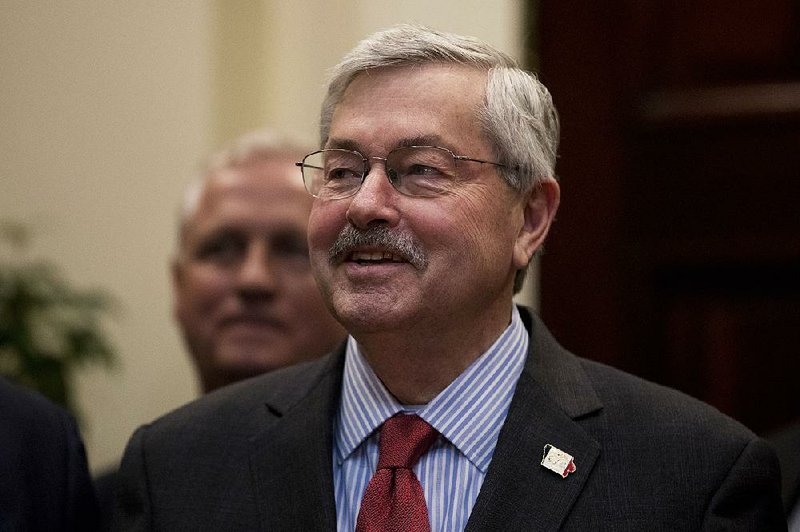WASHINGTON -- The Midwestern governor whom President Donald Trump picked to be his ambassador to China pledged on Tuesday to confront Beijing on a range of contentious issues, including human rights and trade, and assured lawmakers he'll push the Chinese to act more aggressively to defuse North Korea's nuclear weapons program.
During his confirmation hearing before the Senate Foreign Relations Committee, Iowa Gov. Terry Branstad said he hopes to leverage his decadeslong relationship with Chinese President Xi Jinping to advance U.S. and international interests.
"As an old friend, I'd tell him where he's falling short," Branstad said, telling senators he won't be bashful about raising uncomfortable topics. The two met in 1985 when Xi, at the time a provincial official, led an agricultural trade delegation to Iowa.
Asked by Sen. Bob Menendez, D-N.J., if he considers China to be an enemy or an ally, Branstad paused and said it was a tough question. The relationship between the two economic powers fluctuates between those two extremes, Branstad said, and the U.S. should strive to be partners with China instead of adversaries. But China also has an obligation to play by the rules, he said.
[PRESIDENT TRUMP: Timeline, appointments, executive orders + guide to actions in first 100 days]
Branstad said he won't hesitate to meet with Chinese dissidents and activists and would even welcome them to the U.S. Embassy in Beijing. He also said he intends to travel to every province in China just as he's traveled to every county in Iowa.
Branstad called North Korea's push for a weapon of mass destruction a "threat to all of humankind." Although senators pressed Branstad for specifics on how he would address North Korea with Xi and other Chinese leaders, he stuck to broad themes. He said recent events, which include missile tests by North Korea, should prompt China to take the threat more seriously. He also said he expects China to become more engaged because of concerns that North Korean refugees may flood China if the crisis on the Korean Peninsula escalates further.
"They are the ones who have the potential to influence the regime in North Korea more than anyone else," Branstad said of China. "It is probably the most pressing issue we have right now." He said he envisioned his role as a "go-between" to find a resolution.
Trump has sought better relations with China as the threat from North Korea has escalated. Trump recently hosted Xi at Trump's Florida resort. But for years before, Trump said China was "eating our lunch," and he promised during the presidential campaign to label China a currency manipulator as one of his first acts. He even threatened to start a trade war, arguing that China's trade surplus was the major reason for America's economic woes.
But Trump has since abandoned that pledge, his thinking changed by the growing focus on the threat from North Korea and fears that the isolated nation will succeed in developing a nuclear-tipped missile capable of hitting the United States. Trump wants help from China, which is North Korea's primary trading partner.
Branstad said China had manipulated its currency to lower the cost of its exported products and to raise the price of U.S. imports. "I think that has changed in the last year or so," Branstad told the committee. But he said that's an issue that remains a concern and needs to be monitored closely.
Trump also backed away from a threat to jettison America's one-China policy, which recognizes the government in Beijing as China's government and maintains only unofficial relations with the government in Taiwan. Trump angered China by speaking to Taiwan's president before his inauguration in a breach of diplomatic protocol. China still regards the island as part of its territory and would consider it unacceptable for the U.S. to recognize Taiwan's leader as a head of state.
Branstad, 70, is in the midst of his sixth nonconsecutive term as governor. He served from 1983-99 before entering the private sector. He was re-elected in 2010. With more than 22 years at the helm of Iowa government, Branstad is the country's longest-serving governor.
A Section on 05/03/2017
